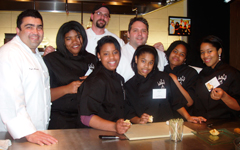A Lesson on Respect
Blog post by Maeve Rafferty, Community MVPs Coordinator and instructor at Brainfood Mt. Vernon
I don’t like when they put me in a certain category, when they judge me for who I am with.
Or when they assume I don’t know something, just because I am young.
- “Brainfood Community MVPs”
I usually begin each MVP class with a quote or question. My hope is that it sets the tone for class, so that no matter where you’ve been or what has happened that day, we take time to remember that we are all here, in this space, for the same purpose. I like to think that it helps make room in participants’ minds for what they are about to create amidst the thoughts of project deadlines, strict teachers, upcoming college visits, or their latest crush. 
A few classes ago, instead of opening with a quote, I asked participants a question burning in my mind after completing a youth development training course: What is it that adults do that makes you feel disrespected? The question was my homework assignment from the course, and I was both excited and nervous to pose the question.
I was excited to hear participants’ thoughts because I’m consistently impressed by their thoughtful insight and depth. I was nervous too, wondering what would happened if it turned into a full-fledged bashing session about all the adults in their lives that have done them wrong, with me just standing there, bewildered, not knowing how to repair all the damage?
Though what actually happened was this: one student read the question aloud, and the room just became extremely still and quiet, as students fixed their eyes on me then on each other, processing each word and analyzing what it all meant.
It was as if I posed a riddle.
I think this was the first time anyone had ever asked them this question before, and they wanted to choose their words carefully. I held back from breaking the silence, worried that I may disrupt something really powerful.
After a few moments a girl to my right finally spoke.
I don’t like it when old men try and talk to me. It makes me uncomfortable.
I nodded and agreed, validating her thoughts, but then simply keeping quiet as students around the circle shared the things that really bothered them. Pretty soon they were the ones validating each other, sharing and supporting one another as they gave completely honest and raw answers. I’ve never been to a support group before, but I have to think it must feel a bit like this.
As time went on and the question began to really sink in, my students were throwing out responses left and right, faster than my hand could record. I liked that even though I was fully present in the room, in this moment, I became invisible. Suddenly our kitchen had become their own safe space to let their guard down and honor each other’s feelings and I didn’t do a thing to create that.
 I don’t like when my words are misinterpreted.
I don’t like when my words are misinterpreted.
Or when they ignore me.
Or when they don’t admit when they have done something wrong.
Nearly twenty minutes had gone by before I attempted to chime in though a girl furthest away from me, who is often very shy, spoke up first and asked, “Why are you doing this?” I could tell by her face that she wondered if I were using this for some sort of research assignment, like I was just asking for my own self, not really having any regard to what they actually said.
I shared that I wanted to know their opinions because as they go out into the community and begin leading cooking workshops of their own, they will have to work with adults. And I wanted them to know that if these things happen we need to know how to work through them…. together.
I also apologized. I apologized for anytime I had done something on this list. For the first time, in a long time, I felt completely vulnerable and exposed. It’s interesting how saying I was sorry felt a tad foreign to me, how even though we as adults mess up, we forget to say it, because no one is standing over us telling us we have too or we won’t be able to go out with our friends. It felt really liberating.
I offered the idea that maybe we should create some sort of word or symbol that only we know, that they could say or do when they felt disrespected and then I could come running to help.
They didn’t particularly like that idea, and for good reason: they had their own idea. Their idea, as it often happens, ended up being way better, and I am so grateful that they shared it.

How about we write an expectations poster for the adults we work with. We have a poster of what is expected of us in this program but what if we write what we expect of them.
Yes, of course. That is a fantastic idea. So that is just what we did.







Comments
Post new comment